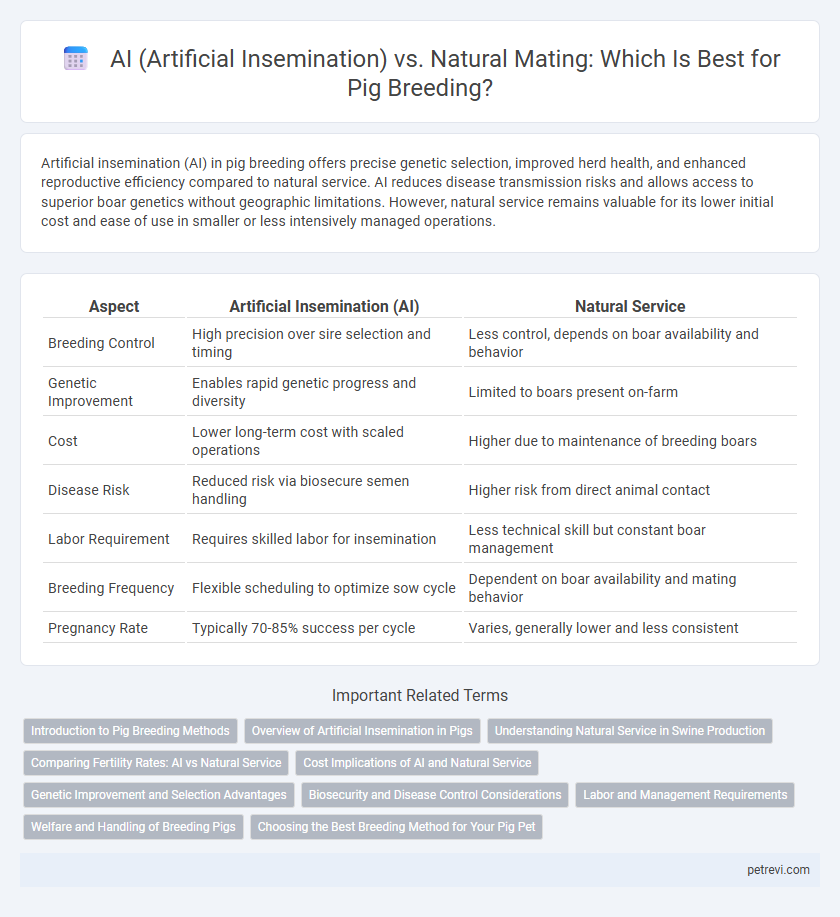Artificial insemination (AI) in pig breeding offers precise genetic selection, improved herd health, and enhanced reproductive efficiency compared to natural service. AI reduces disease transmission risks and allows access to superior boar genetics without geographic limitations. However, natural service remains valuable for its lower initial cost and ease of use in smaller or less intensively managed operations.
Table of Comparison
| Aspect | Artificial Insemination (AI) | Natural Service |
|---|---|---|
| Breeding Control | High precision over sire selection and timing | Less control, depends on boar availability and behavior |
| Genetic Improvement | Enables rapid genetic progress and diversity | Limited to boars present on-farm |
| Cost | Lower long-term cost with scaled operations | Higher due to maintenance of breeding boars |
| Disease Risk | Reduced risk via biosecure semen handling | Higher risk from direct animal contact |
| Labor Requirement | Requires skilled labor for insemination | Less technical skill but constant boar management |
| Breeding Frequency | Flexible scheduling to optimize sow cycle | Dependent on boar availability and mating behavior |
| Pregnancy Rate | Typically 70-85% success per cycle | Varies, generally lower and less consistent |
Introduction to Pig Breeding Methods
Artificial Insemination (AI) in pig breeding offers precise control over genetic selection, improving herd quality and disease management compared to Natural Service. AI enables rapid dissemination of superior boar genetics across multiple sows, increasing reproductive efficiency and litter uniformity. Natural Service relies on live boars for mating, which may limit genetic diversity and poses higher risks of disease transmission and labor costs.
Overview of Artificial Insemination in Pigs
Artificial insemination (AI) in pigs involves collecting semen from boars and manually inseminating sows to improve genetic traits and reproductive efficiency. AI enables precise control over breeding schedules, enhances biosecurity by reducing disease transmission, and increases genetic diversity compared to natural service. Adoption of AI in pig breeding has led to higher conception rates, increased litter sizes, and optimized herd genetics through superior sire selection.
Understanding Natural Service in Swine Production
Natural service in swine production involves the direct mating of a boar with a sow, ensuring natural reproductive behaviors and minimizing the need for specialized equipment. This approach supports genetic diversity and allows for easier management in small-scale or traditional pig farming systems. While less technologically advanced than artificial insemination (AI), natural service remains vital for certain operations where boar availability and natural fertility are prioritized.
Comparing Fertility Rates: AI vs Natural Service
Artificial Insemination (AI) in pig breeding typically shows higher fertility rates compared to natural service, with conception rates ranging from 75% to 85% in AI versus 60% to 70% in natural service. AI allows for precise timing of insemination using estrus detection, which enhances fertilization success and litter size while reducing the spread of diseases. Despite natural service offering easier management, the genetic improvement and biosecurity advantages of AI make it the preferred method for increasing reproductive efficiency in swine production.
Cost Implications of AI and Natural Service
Artificial Insemination (AI) in pig breeding reduces long-term costs by minimizing the need for maintaining multiple boars and improving genetic diversity, which enhances herd productivity. Natural service involves higher expenses related to boar upkeep, including feed, housing, and health care, leading to increased operational costs. Although AI requires investment in skilled labor and specialized equipment, its efficiency and scalability contribute to overall cost savings compared to natural service.
Genetic Improvement and Selection Advantages
Artificial insemination (AI) in pig breeding enhances genetic improvement by enabling the use of superior boar semen across multiple sows, increasing selection intensity and accelerating genetic gains. AI facilitates accurate recording and evaluation of sire performance, optimizing breeding decisions with reliable pedigree and performance data. In contrast, natural service limits genetic diversity and slows selection progress due to restricted boar usage and less precise breeding records.
Biosecurity and Disease Control Considerations
Artificial Insemination (AI) in pig breeding enhances biosecurity by minimizing direct contact between boars and sows, significantly reducing the risk of disease transmission such as PRRS and swine influenza. Natural service increases the likelihood of pathogen spread through physical interaction, complicating disease control efforts in commercial operations. Implementing AI protocols coupled with strict sanitation and monitoring can improve herd health and biosecurity outcomes in pig breeding programs.
Labor and Management Requirements
Artificial Insemination (AI) in pig breeding reduces labor by minimizing the need for constant boar management and improves biosecurity through controlled semen handling. Natural service requires intensive labor for boar maintenance, heat detection, and physical mating, increasing management complexity and risks of injury or disease transmission. AI allows better scheduling and record-keeping, enhancing overall reproductive efficiency and farm management.
Welfare and Handling of Breeding Pigs
Artificial insemination (AI) in pig breeding enhances welfare by reducing the physical stress and risk of injury associated with natural service, as it eliminates the need for frequent boar introduction and aggressive mounting behavior. AI allows for controlled semen quality and precise timing, improving reproductive efficiency while minimizing handling frequency, which reduces stress on sows and boars. Natural service often leads to higher injury rates and increased boar aggression, impacting pig welfare negatively compared to the more controlled environment provided by AI protocols.
Choosing the Best Breeding Method for Your Pig Pet
Choosing the best breeding method for your pet pig depends on factors like genetic goals, health management, and cost-effectiveness. Artificial Insemination (AI) offers precise genetic control, reduces disease risk, and allows access to superior boar genetics without transport stress. Natural Service provides a more straightforward, less technical approach but carries higher risks of disease transmission and limits genetic diversity compared to AI.
AI (Artificial Insemination) vs Natural Service for Pig Breeding Infographic

 petrevi.com
petrevi.com